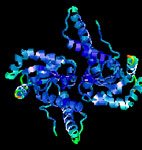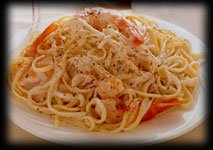I know I've heard this mentioned before, but I found this interesting article that tries to explain it all in one place while I was googling what my kid should eat during a swim meet. Would you all agree with everything written here? I thought post-workout nutrition should be mostly protein, but it looks like that's not necessarily true?
By: John Berardi
You don't need to be a resource management specialist to know that time is the most valuable finite resource that you have. And as you well know, there's a very limited amount of it to go around. So if you're smart, you'll figure out ways to get the greatest return on the investment of your time.
While this may be well recognized and applied in many aspects of modern life, it confuses me as to why people seem to ignore this when it comes to their exercise training. From what I see on a daily basis, it's clear to me that most people in the gym are wasting their time investment. They're spending precious hours engaged in strength or endurance training programs that yield little or no results?
Need proof? When was the last time someone in your gym made any noticeable physical progress? In fact, when was the last time that you made any significant physical progress? Exercise training has the potential to yield huge returns on any given time investment. Isn't it a shame that most people don't ever see this magnitude of return?

Despite this disappointing reality, I'm here to tell you that hope is not lost. In fact, there's a very easy way to capitalize on your investment. You see, in most cases the exercise is not the problem. The problem is that people fail to invest in the other important commodity that, in combination with exercise, yields the biggest returns.
They're buying the cart without the horse, the lemonade stand without the lemonade. They're spending their time focused on only the exercise program while ignoring the importance of a sound nutritional program.
Now I could write a dozen articles focused on straightening out the nutritional problems of the world. But those articles are for another day. In this article today, I intend to focus on what is, in my opinion, the most important aspect of
exercise nutrition - eating during the post-workout period. The knowledge of how to eat during this time will maximize your efforts in the gym and yield the biggest returns on your time investment.
 Remodeling and The Post-Workout Period
Remodeling and The Post-Workout Period


Exercise, both strength and endurance training, is responsible for countless health and aesthetic benefits. However the exercise itself is a significant physiological stressor. Perceived symptoms of this "stress" are often mild and include muscle soreness, the need for extra
sleep, and an increased appetite.
These symptoms let us know that the exercise has depleted the muscle's fuel resources, caused some minor damage, and that the muscle is in need of replenishment and repair. While the words depletion and damage may sound like negative things, they're not if they only stick around for a short period of time. You see, these changes allow the muscle to adapt by getting better at the exercise demands placed on it.
Therefore if you're doing endurance exercise, the muscle will become depleted and damaged in the short run, but in the long run it will super compensate, building itself up to be a better aerobic machine. And if strength training is your thing, you'll tear down you're weaker muscle fibers in favor of building up bigger, stronger ones.
In all cases, exercise essentially tears down old, less adapted muscle in order to rebuild more functional muscle. This phenomenon is called remodeling.
While the remodeling process is much more complex than I can describe here, it's important for me to emphasize that this remodeling only takes place if the muscle is provided the right raw materials. If I plan on remodeling my home I can hire a guy to tear down a couple of walls, a guy to clean up the mess, and a guy to come in and rebuild better walls than the ones that came down.
But if I don't give that guy any bricks, how's he going to get anything done? If I don't give him the bricks, all I'll have in the end is a much smaller, unfinished house.

The same holds true with exercise remodeling. In particular, during the exercise bout and immediately following it, exercise breaks down our muscle
carbohydrate stores and our muscle
protein structures. Then, the
immune system comes in to clean up the mess.
And finally, signals are generated to tell the body to rebuild. However, as I hope you can now see, without the proper protein and carbohydrate raw materials, this building can't take place. You'll be left with muscles that never reach their potential.
So with this analogy, I hope it's obvious that this post-exercise period is not a time to take lightly. Remember, you spent a significant amount of time in the gym breaking down the muscle for a good reason. You want it to be better adapted to future demands.
So to realize full return on your time investment, you need to give the body the raw materials it needs, namely protein and carbohydrates.
 Feeding Hungry Muscles
Feeding Hungry Muscles

As I mentioned earlier, all trainees (male or female), regardless of their chosen mode of exercise, must take their post-exercise nutrition seriously in order to provide the muscle with the raw materials it needs. As all types of exercise use carbohydrates for energy, muscle carbohydrate depletion is inevitable. Therefore a post-workout meal high in carbohydrates is required to refill muscle carbohydrate/energy stores.
However any ol' amount of carbohydrates will not do. You need to consume enough carbohydrates to promote a substantial
insulin release. Insulin is the hormone responsible for shuttling carbohydrates and
amino acids into the muscle. In doing this, carbohydrate resynthesis is accelerated and
protein balance becomes positive, leading to rapid repair of the muscle tissue.

Therefore, by consuming a large amount of carbohydrates, you will promote a large insulin release, increase glycogen storage, and increase protein repair. Research has shown that a carbohydrate intake of 0.8 to 1.2 grams per 1 kilogram of body weight maximizes glycogen synthesis and accelerates protein repair. However, unless you've had a very long, intense workout, 1.2g/kg may be a bit excessive as excess carbohydrate can be converted to bodyfat.
Therefore I recommend 0.8g of carbohydrate per 1 kilogram of body weight for speeding up muscle carbohydrate replenishment while preventing excess fat gain (van Loon et al 2000a).
In addition, since muscle protein is degraded during exercise, the addition of a relatively large amount of protein to your post exercise meal is necessary to help rebuild the structural aspects of the muscle. After exercise, the body decreases its rate of protein synthesis and increases its rate of protein breakdown. However, the provision of protein and amino acid solutions has been shown to reverse this trend, increasing protein synthesis and decreasing protein breakdown.
Researchers have used anywhere from 0.2g - 0.4g of protein per 1 kilogram of body weight to demonstrate the effectiveness of adding protein to a post-workout carbohydrate drink (van Loon et al 2000b, Roy et al 1998). As an increased consumption of the essential amino acids may lead to a more positive protein balance, 0.4g/kg may be better than 0.2g/kg.
While your post-workout feeding should be rich protein and carbohydrate, this meal should be fat free. The consumption of essential fats is one of the most overlooked areas of daily nutritional intake but during the post workout period, eating fat can actually decrease the effectiveness of your post-workout beverage. Since fat slows down transit through the stomach, eating fat during the post workout period may slow the digestion and absorption of carbohydrates and proteins.
As your post workout feeding should be designed to promote the most rapid delivery of carbohydrates and protein to your depleted muscles, fats should be avoided during this time.
Finally, another important factor to consider is the timing of this meal. It is absolutely crucial that you consume your post-workout meal immediately after exercise. As indicated above, after exercise, the muscles are depleted and require an abundance of protein and carbohydrate. In addition, during this time, the muscles are biochemically "primed" for nutrient uptake.

This phenomenon is commonly known as the "window of opportunity". Over the course of the recovery period, this window gradually closes and by failing to eat immediately after exercise, you diminish your chances of promoting full recovery. To illustrate how quickly this window closes, research has shown that consuming a post-exercise meal immediately after working out is superior to consuming one only 1 hour later.
In addition, consuming one 1 hour later is superior to consuming one 3 hours later (Tipton et al 2001, Levenhagen et al 2001). If you wait too long, glycogen replenishment and protein repair will be compromised.
In conclusion, when you decided to start exercising you decided to give up a specific amount of time per week in the interest of getting better, physically. However, if you haven't spent the necessary time thinking about post-exercise nutrition, you're missing much of the benefit that comes with exercising. I assure you that once you start paying attention to this variable in the recovery equation, your time in the gym will be much better invested.